Unit 3 Festivals and Holidays Lesson 7 Chinese New Year 2 课件(共40张PPT,无音频)
文档属性
| 名称 | Unit 3 Festivals and Holidays Lesson 7 Chinese New Year 2 课件(共40张PPT,无音频) |

|
|
| 格式 | zip | ||
| 文件大小 | 2.8MB | ||
| 资源类型 | 教案 | ||
| 版本资源 | 北师大版 | ||
| 科目 | 英语 | ||
| 更新时间 | 2020-05-19 00:00:00 | ||
图片预览

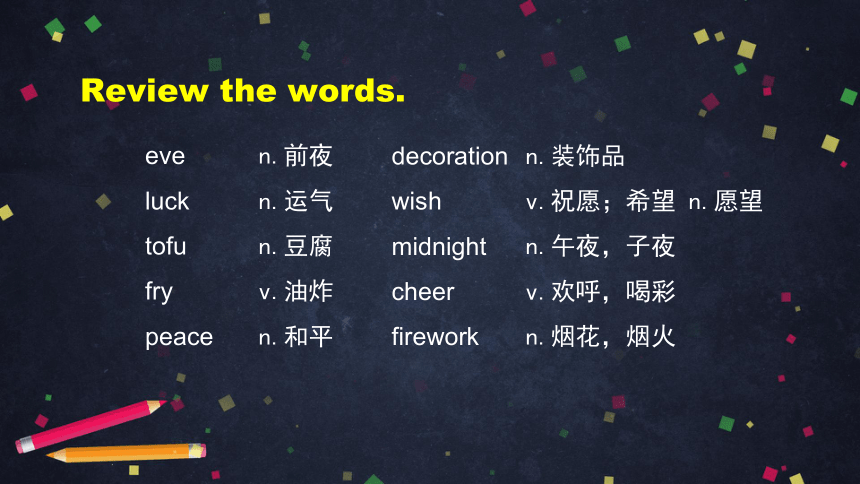
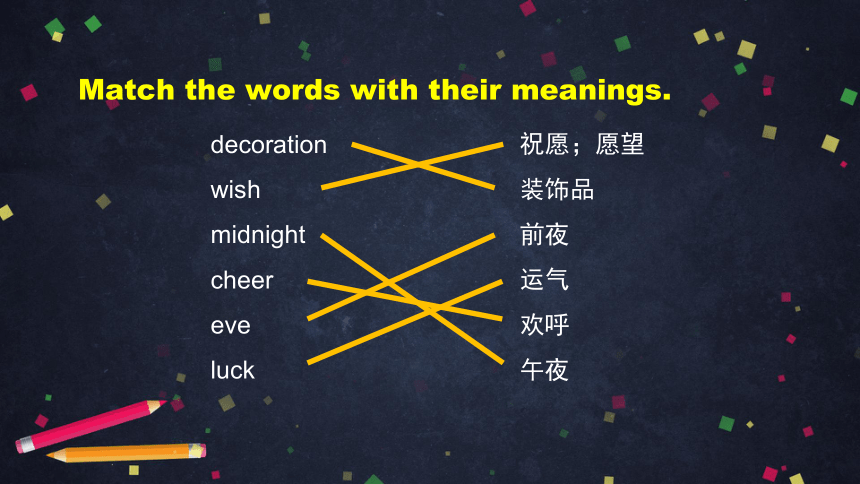


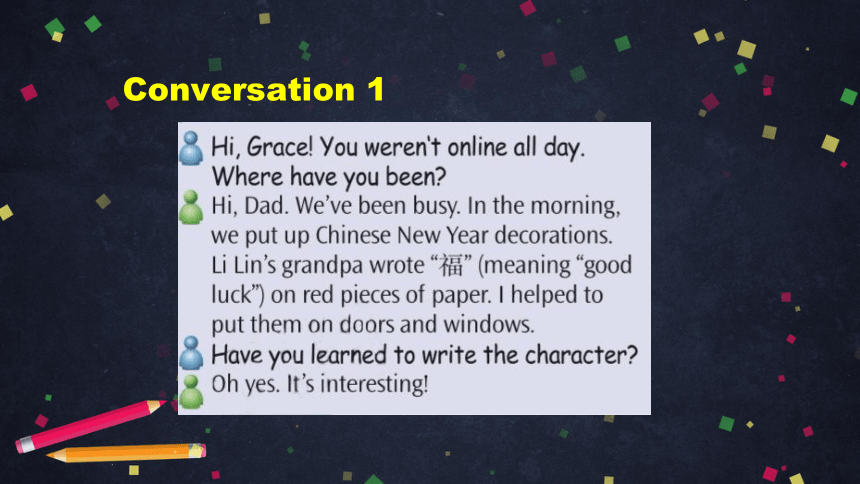
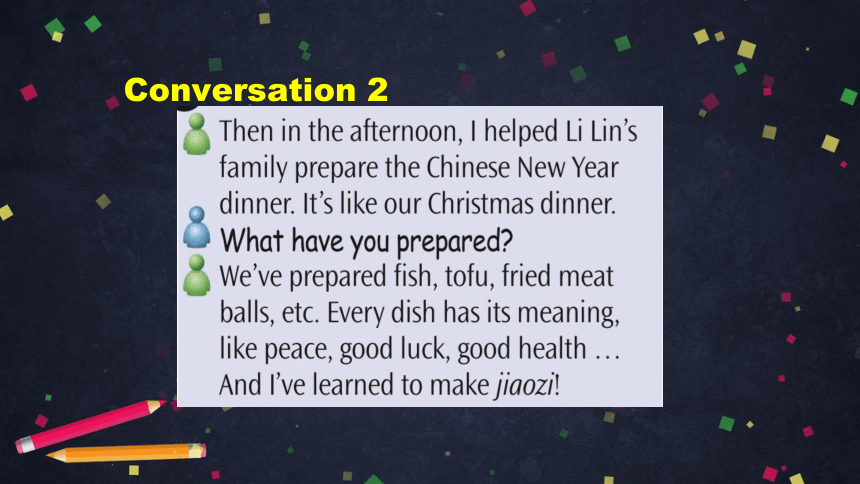
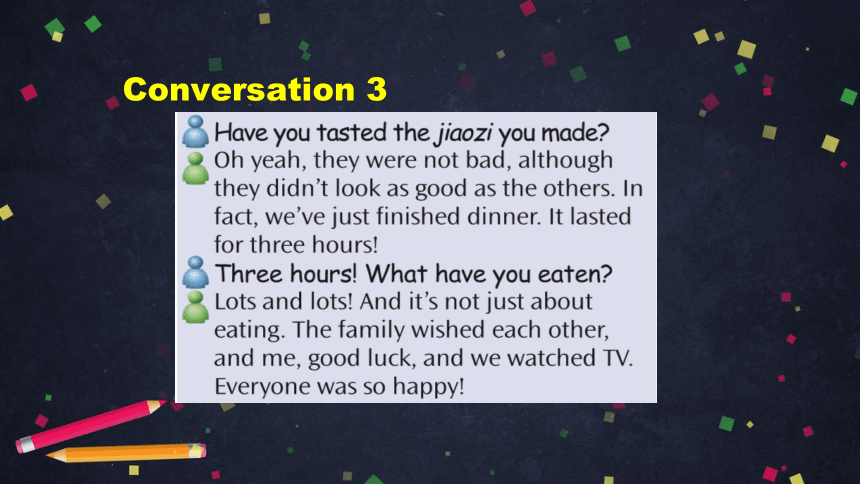

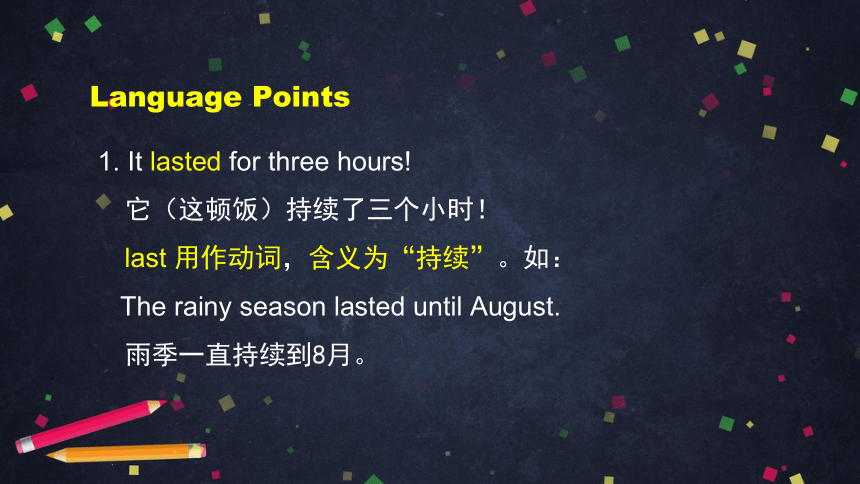
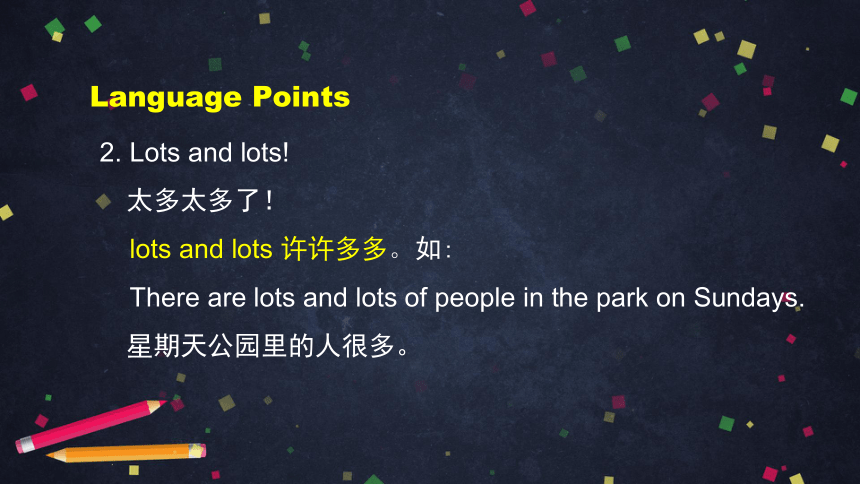
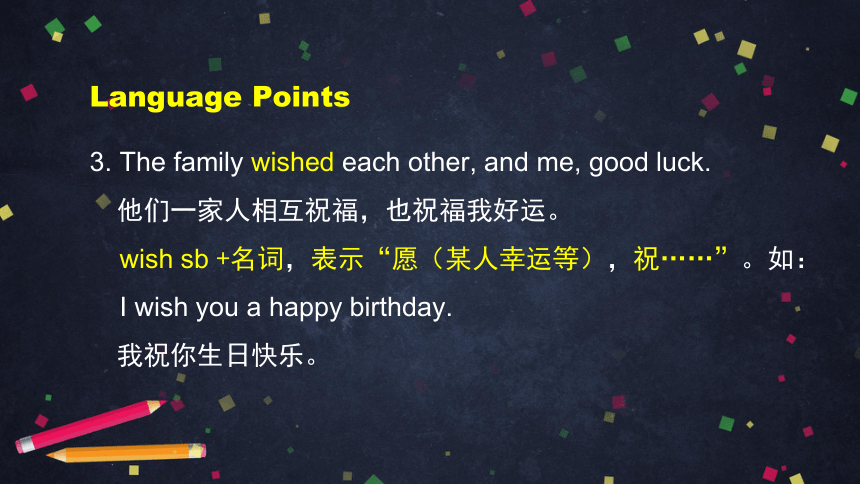
文档简介
(共40张PPT)
U3 Lesson 7 Chinese New Year 2
初二年级 英语
Review the words.
eve
luck
tofu
fry
peace
n.前夜
n.运气
n.豆腐
v.油炸
n.和平
decoration
wish
midnight
cheer
firework
n.装饰品
v.祝愿;希望 n.愿望
n.午夜,子夜
v.欢呼,喝彩
n.烟花,烟火
Match the words with their meanings.
祝愿;愿望
装饰品
前夜
运气
欢呼
午夜
decoration
wish
midnight
cheer
eve
luck
Match the phrases with their meanings.
拍照
像……一样
事实上
挂装饰品
备餐
put up decorations
prepare dinner
as... as...
take photos
in fact
Review the passage.
Conversation 1
Conversation 2
Conversation 3
Conversation 4
1. It lasted for three hours!
它(这顿饭)持续了三个小时!
last 用作动词,含义为“持续”。如:
The rainy season lasted until August.
雨季一直持续到8月。
Language Points
2. Lots and lots!
太多太多了!
lots and lots 许许多多。如:
There are lots and lots of people in the park on Sundays.
星期天公园里的人很多。
Language Points
3. The family wished each other, and me, good luck.
他们一家人相互祝福,也祝福我好运。
wish sb +名词,表示“愿(某人幸运等),祝……”。如:
I wish you a happy birthday.
我祝你生日快乐。
Language Points
4. Just before midnight, everyone went outside and millions
of fireworks went off together.
午夜间,人们走到户外,无数的烟花同时爆响。
(1)millions of 数百万的……, 大量的……。如:
There were millions of people in the square.
广场上有很多很多的人。
Language Points
hundreds of 数以百计的
thousands of 成千上万的
Language Points
(2) go off 意为“爆发,产生很大的声音”。如:
He didn’t wake up though the alarm clock went off.
尽管闹钟响了,他还是没醒来。
4. Just before midnight, everyone went outside and millions
of fireworks went off together.
Language Points
1. Where have you been?
2. Have you learned to write the character?
3. What have you prepared?
4. Have you tasted the jiaozi you made?
5. What have you eaten?
6. Have you taken any photos?
Find what questions Grace’s father asked from the passage.
1. Where have you been?
2. What have you prepared?
3. What have you eaten?
1. Have you learned to write the character?
2. Have you tasted the jiaozi you made?
3. Have you taken any photos?
Find what questions Grace’s father asked from the passage.
Complete the table with has, have, hasn’t or haven’t.
Complete the table with has, have, hasn’t or haven’t.
疑问句
I / we / you / they
he / she / it written Chinese?
Yes, I . / No, I .
Yes, he . / No, he .
Have
Has
have
has
hasn’t
haven’t
Complete the table with has, have, hasn’t or haven’t.
疑问句
Where
Who / What I / we / you / they been?
he / she / it seen?
have
has
A: you (take) photos of the decorations?
B: No, I (do) that.
A: she ever (see) the fireworks at midnight?
B: No, she ever (see) them.
haven’t done
Complete the dialogues using the present perfect tense.
Have
taken
Has
seen
hasn’t
seen
3. A: Where they (be)?
B: They (be) at their grandparents’ house.
4. A: What you (eat)?
B: We (eat) a lot of fish.
Complete the dialogues using the present perfect tense.
have
been
have been
have
eaten
have eaten
A: Have you taken photos of the decorations?
B: No, I haven’t done that.
A: Has she ever seen the fireworks at midnight?
B: No, she hasn’t ever seen them.
Complete the dialogues using the present perfect tense.
3. A: Where have they been?
B: They have been at their grandparents’ house.
4. A: What have you eaten?
B: We have eaten a lot of fish.
Complete the dialogues using the present perfect tense.
现在完成时
1.发生在过去但对现在有影响的动作。例如:
2.发生在过去,持续到现在的工作。例如:
I have lost my keys.
She has been an English teacher for five years.
( The Present Perfect )
一般过去时
1.在过去时间完成的动作。例如:
2.过去习惯性的动作或反复、持续发生的状态。例如:
She suddenly fell ill yesterday.
He was very busy when I saw him.
( The Past Simple )
一般现在时
1.经常发生或反复发生的动作。例如:
2.现在的情况或状态。例如:
3.客观事实或普遍真理。例如:
He usually takes a walk after supper.
My father works in a bank.
The sun rises in the east.
( The Present Simple )
Complete the questions according to their answers.
1. – you ever Chinese? (write)
– No, I haven’t.
2. – you jiaozi? (like)
– Yes, we do.
Have
written
Do
like
Complete the questions according to their answers.
3. – What ?
– I’ve made jiaozi.
4. – Where ?
– I went to the market.
have you made
did you go
1. – Have you ever written Chinese?
– No, I haven’t.
2. – Do you like jiaozi?
– Yes, we do.
Read the dialogues together.
3. – What have you made?
– I’ve made jiaozi.
4. – Where did you go?
– I went to the market.
Read the dialogues together.
I (never / write) Chinese. (present perfect)
2. They (not see) us at the market.
(past simple)
3. We (never / see) our friends here.
(present simple)
Complete the following sentences using the tense indicated.
现在完成时
一般过去时
一般现在时
I (never / write) Chinese. (present perfect)
2. They (not see) us at the market.
(past simple)
Complete the following sentences using the tense indicated.
have never written
didn’t see
3. We (never / see) our friends here.
(present simple)
4. What you usually (do) on New Year’s Eve?
(present simple)
Complete the following sentences using the tense indicated.
never see
do
do
5. Who they (talk) to on the beach?
(past simple)
6. The boys are so dirty! Where they (be)?
(present perfect)
Complete the following sentences using the tense indicated.
did
talk
have
been
Read the sentences.
I have never written Chinese.
They didn’t see us at the market.
We never see our friends here.
What do you usually do on New Year’s Eve?
Who did they talk to on the beach?
The boys are so dirty! Where have they been?
Discussion
Ask your partner. Have you ever done the things below?
cook Chinese New Year dinner
make jiaozi
set off fireworks
buy flowers at a market
send text messages to friends
Example
A: Have you ever made jiaozi?
B: Yes, I have.
A: Have you ever set off fireworks?
B: No, I haven’t.
Homework
Review the text and remember the new words.
Finish the exercise on workbook: P94-C.
Thank you !
U3 Lesson 7 Chinese New Year 2
初二年级 英语
Review the words.
eve
luck
tofu
fry
peace
n.前夜
n.运气
n.豆腐
v.油炸
n.和平
decoration
wish
midnight
cheer
firework
n.装饰品
v.祝愿;希望 n.愿望
n.午夜,子夜
v.欢呼,喝彩
n.烟花,烟火
Match the words with their meanings.
祝愿;愿望
装饰品
前夜
运气
欢呼
午夜
decoration
wish
midnight
cheer
eve
luck
Match the phrases with their meanings.
拍照
像……一样
事实上
挂装饰品
备餐
put up decorations
prepare dinner
as... as...
take photos
in fact
Review the passage.
Conversation 1
Conversation 2
Conversation 3
Conversation 4
1. It lasted for three hours!
它(这顿饭)持续了三个小时!
last 用作动词,含义为“持续”。如:
The rainy season lasted until August.
雨季一直持续到8月。
Language Points
2. Lots and lots!
太多太多了!
lots and lots 许许多多。如:
There are lots and lots of people in the park on Sundays.
星期天公园里的人很多。
Language Points
3. The family wished each other, and me, good luck.
他们一家人相互祝福,也祝福我好运。
wish sb +名词,表示“愿(某人幸运等),祝……”。如:
I wish you a happy birthday.
我祝你生日快乐。
Language Points
4. Just before midnight, everyone went outside and millions
of fireworks went off together.
午夜间,人们走到户外,无数的烟花同时爆响。
(1)millions of 数百万的……, 大量的……。如:
There were millions of people in the square.
广场上有很多很多的人。
Language Points
hundreds of 数以百计的
thousands of 成千上万的
Language Points
(2) go off 意为“爆发,产生很大的声音”。如:
He didn’t wake up though the alarm clock went off.
尽管闹钟响了,他还是没醒来。
4. Just before midnight, everyone went outside and millions
of fireworks went off together.
Language Points
1. Where have you been?
2. Have you learned to write the character?
3. What have you prepared?
4. Have you tasted the jiaozi you made?
5. What have you eaten?
6. Have you taken any photos?
Find what questions Grace’s father asked from the passage.
1. Where have you been?
2. What have you prepared?
3. What have you eaten?
1. Have you learned to write the character?
2. Have you tasted the jiaozi you made?
3. Have you taken any photos?
Find what questions Grace’s father asked from the passage.
Complete the table with has, have, hasn’t or haven’t.
Complete the table with has, have, hasn’t or haven’t.
疑问句
I / we / you / they
he / she / it written Chinese?
Yes, I . / No, I .
Yes, he . / No, he .
Have
Has
have
has
hasn’t
haven’t
Complete the table with has, have, hasn’t or haven’t.
疑问句
Where
Who / What I / we / you / they been?
he / she / it seen?
have
has
A: you (take) photos of the decorations?
B: No, I (do) that.
A: she ever (see) the fireworks at midnight?
B: No, she ever (see) them.
haven’t done
Complete the dialogues using the present perfect tense.
Have
taken
Has
seen
hasn’t
seen
3. A: Where they (be)?
B: They (be) at their grandparents’ house.
4. A: What you (eat)?
B: We (eat) a lot of fish.
Complete the dialogues using the present perfect tense.
have
been
have been
have
eaten
have eaten
A: Have you taken photos of the decorations?
B: No, I haven’t done that.
A: Has she ever seen the fireworks at midnight?
B: No, she hasn’t ever seen them.
Complete the dialogues using the present perfect tense.
3. A: Where have they been?
B: They have been at their grandparents’ house.
4. A: What have you eaten?
B: We have eaten a lot of fish.
Complete the dialogues using the present perfect tense.
现在完成时
1.发生在过去但对现在有影响的动作。例如:
2.发生在过去,持续到现在的工作。例如:
I have lost my keys.
She has been an English teacher for five years.
( The Present Perfect )
一般过去时
1.在过去时间完成的动作。例如:
2.过去习惯性的动作或反复、持续发生的状态。例如:
She suddenly fell ill yesterday.
He was very busy when I saw him.
( The Past Simple )
一般现在时
1.经常发生或反复发生的动作。例如:
2.现在的情况或状态。例如:
3.客观事实或普遍真理。例如:
He usually takes a walk after supper.
My father works in a bank.
The sun rises in the east.
( The Present Simple )
Complete the questions according to their answers.
1. – you ever Chinese? (write)
– No, I haven’t.
2. – you jiaozi? (like)
– Yes, we do.
Have
written
Do
like
Complete the questions according to their answers.
3. – What ?
– I’ve made jiaozi.
4. – Where ?
– I went to the market.
have you made
did you go
1. – Have you ever written Chinese?
– No, I haven’t.
2. – Do you like jiaozi?
– Yes, we do.
Read the dialogues together.
3. – What have you made?
– I’ve made jiaozi.
4. – Where did you go?
– I went to the market.
Read the dialogues together.
I (never / write) Chinese. (present perfect)
2. They (not see) us at the market.
(past simple)
3. We (never / see) our friends here.
(present simple)
Complete the following sentences using the tense indicated.
现在完成时
一般过去时
一般现在时
I (never / write) Chinese. (present perfect)
2. They (not see) us at the market.
(past simple)
Complete the following sentences using the tense indicated.
have never written
didn’t see
3. We (never / see) our friends here.
(present simple)
4. What you usually (do) on New Year’s Eve?
(present simple)
Complete the following sentences using the tense indicated.
never see
do
do
5. Who they (talk) to on the beach?
(past simple)
6. The boys are so dirty! Where they (be)?
(present perfect)
Complete the following sentences using the tense indicated.
did
talk
have
been
Read the sentences.
I have never written Chinese.
They didn’t see us at the market.
We never see our friends here.
What do you usually do on New Year’s Eve?
Who did they talk to on the beach?
The boys are so dirty! Where have they been?
Discussion
Ask your partner. Have you ever done the things below?
cook Chinese New Year dinner
make jiaozi
set off fireworks
buy flowers at a market
send text messages to friends
Example
A: Have you ever made jiaozi?
B: Yes, I have.
A: Have you ever set off fireworks?
B: No, I haven’t.
Homework
Review the text and remember the new words.
Finish the exercise on workbook: P94-C.
Thank you !
同课章节目录
- Unit 1 Technology and the Future
- Lesson 1 Schools of the Future
- Lesson 2 Online Life
- Lesson 3 Tomorrow's Jobs
- Communication Workshop
- Unit 2 Communication
- Lesson 4 Animal Talk
- Lesson 5 Meeting People
- Lesson 6 The Texting Generation
- Communication Workshop
- Unit 3 Festivals and Holidays
- Lesson 7 Chinese New Year
- Lesson 8 A Picnic
- Lesson 9 Thanksgiving
- Communication Workshop
- Unit 4 Dealing with Problems
- Lesson 10 Problem Page
- Lesson 11 Online Time
- Lesson 12 Generation Gap
- Communication Workshop
- Unit 5 Memories
- Lesson 13 A Daughter's Letter
- Lesson 14 Grandpa's Memories
- Lesson 15 Life in the 1950s
- Communication Workshop
- Unit 6 Detectives
- Lesson 16 A Detective Story (I)
- Lesson 17 A Detective Story (II)
- Lesson 18 The Mystery Writer
- Communication Workshop
